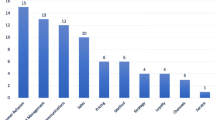Abstract
This paper examines the role of explanation in theory development, and the factors which make an explanation acceptable. Normative criteria for developing valid explanatory models are proposed. Criteria for appraising competing models are also presented. Two separate hierarchies are proposed, and are illustrated using a well-known model in marketing. It is hoped that this will lead to greater public debate relating to the assessment of theory development in marketing.
Access this chapter
Tax calculation will be finalised at checkout
Purchases are for personal use only
Preview
Unable to display preview. Download preview PDF.
Similar content being viewed by others
References
Anderson, Paul F. 1983. "Marketing, Scientific Progress, & Scientific Method. "Journal of Marketing. 47(Fair): 18–31.
—. 1988. "Relative to What - That is the Question." Journal of Consumer Research. 15 (June): 133–137.
Bagozzi, Richard P. 1984. "A Prospectus for Theory Construction in Marketing", Journal of Marketing. 48 (Winter): 11–29.
Calder, Bobby J., Lynn W. Phillips, and Alice M. Tybout. 1981. "Designing Research for Application", Journal of Consumer Research. 8 (September): 197–207.
Converse, Paul D. 1949. "New Laws of Retail Gravitation", Journal of Marketing. 14 (October): 379–84.
Hage, Jerald. 1972. Techniques and Problems of Theory Construction in Sociology. New York: John Wiley.
Hempel, Carl G. 1966. Philosophy of Natural Science. Englewood Cliffs, NJ: Prentice Hall.
—and Paul Oppenheim. 1953. "The Logic of Explanation", in Readings in the Philosophy of Science. H.Feigl and M. Brodbeck, eds., New York: Appleton.
Huff, David L. 1964. "Defining and Estimating a Trading Area", Journal of Marketing. 28 (July): 34–48.
–and Richard R.Batsell. 1977. "Delimiting the Areal Extent of a Market Area. " Journal of Marketing Research. 4(November): 581–5.
Hunt, Shelby D. 1983a. Marketing Theory: The Philosophy of Marketing Science Homewood,IL: Irwin.
—. 1983b. "General Theories and the Fundamental Explanada of Marketing," Journal of Marketing. 47 (Fall): 18–31.
—. 1989. "Naturalistic, Humanistic, and Interpretive Enquiry: Challenges and Ultimate Potential," in Interpretive Consumer Research, ed. Elizabeth Hirschman, Provo, UT: Association for Consumer Research.
—. 1990. "Truth in Marketing Theory and Research," Journal of Marketing. 54(July): 1–15.
Jacobson, Robert. 1988. "Distinguishing Among Competing Theories of the Market Share Effect. " Journal of Marketing. 52 (October): 68–80.
Kuhn, Thomas S. 1970. The Structure of Scientific Revolutions. Chicago,IL: University of Chicago Press.
Meehan, Eugene J. 1968. Explanation in Social Science: A System Paradigm. Homewood, IL: Dorsey.
Merton, R. 1968. Social Theory and Social Structure. NY:Free Press.
Mittelstaedt, Robert A. 1971. "Criteria for a Theory of Consumer Behavior," in Consumer Behavior: Contemporary Research in Action, eds. Robert J. Holloway, Robert A. Mittelstaedt, and M. Venkatesan, 8– 13. Boston, MA: Houghton Mifflin.
Monroe, Kent et al. 1988. "Developing, Disseminating, and Utilizing Marketing Knowledge. " Journal of Marketing. 52 (October): 1–25.
Nagel, Ernest. 1961. The Structure of Science. New York: Harcourt Brace, Jovanovich.
Popper, Karl R. 1983. Realism and the Aim of Science. Totowa, NJ: Rowman and Littlefield.
Sheth, Jagdish N. and Dennis E. Garrett. 1986. Marketing Theory: Classic and Contemporary Readings. Cincinatti, Ohio: Southwestern Publishing Co.
Siegel, Harvey. 1988. "Relativism for Consumer Research?" J. of Consumer Research. 15(June): 129–132.
Turner, Merle B. 1965. Philosophy and the Science of Behavior. New York: Appleton.
Woodward, James. 1979. "Scientific Explanation", The British Journal of the Philosophy of Science. 30: 41–67.
Zaltman, Gerald, Christian R.A.Pinson, and R. Angelmar. 1973. Metatheory and Consumer Research. NY: Holt.
Ziman, John. 1978. Reliable Knowledge. Cambridge, U.K.: Cambridge University Press.
Author information
Authors and Affiliations
Editor information
Editors and Affiliations
Rights and permissions
Copyright information
© 2015 Academy of Marketing Science
About this paper
Cite this paper
Misra, S. (2015). Normative Criteria for the Development and Appraisal of Marketing Theory. In: Crittenden, V.L. (eds) Proceedings of the 1992 Academy of Marketing Science (AMS) Annual Conference. Developments in Marketing Science: Proceedings of the Academy of Marketing Science. Springer, Cham. https://doi.org/10.1007/978-3-319-13248-8_75
Download citation
DOI: https://doi.org/10.1007/978-3-319-13248-8_75
Published:
Publisher Name: Springer, Cham
Print ISBN: 978-3-319-13247-1
Online ISBN: 978-3-319-13248-8
eBook Packages: Business and EconomicsBusiness and Management (R0)




